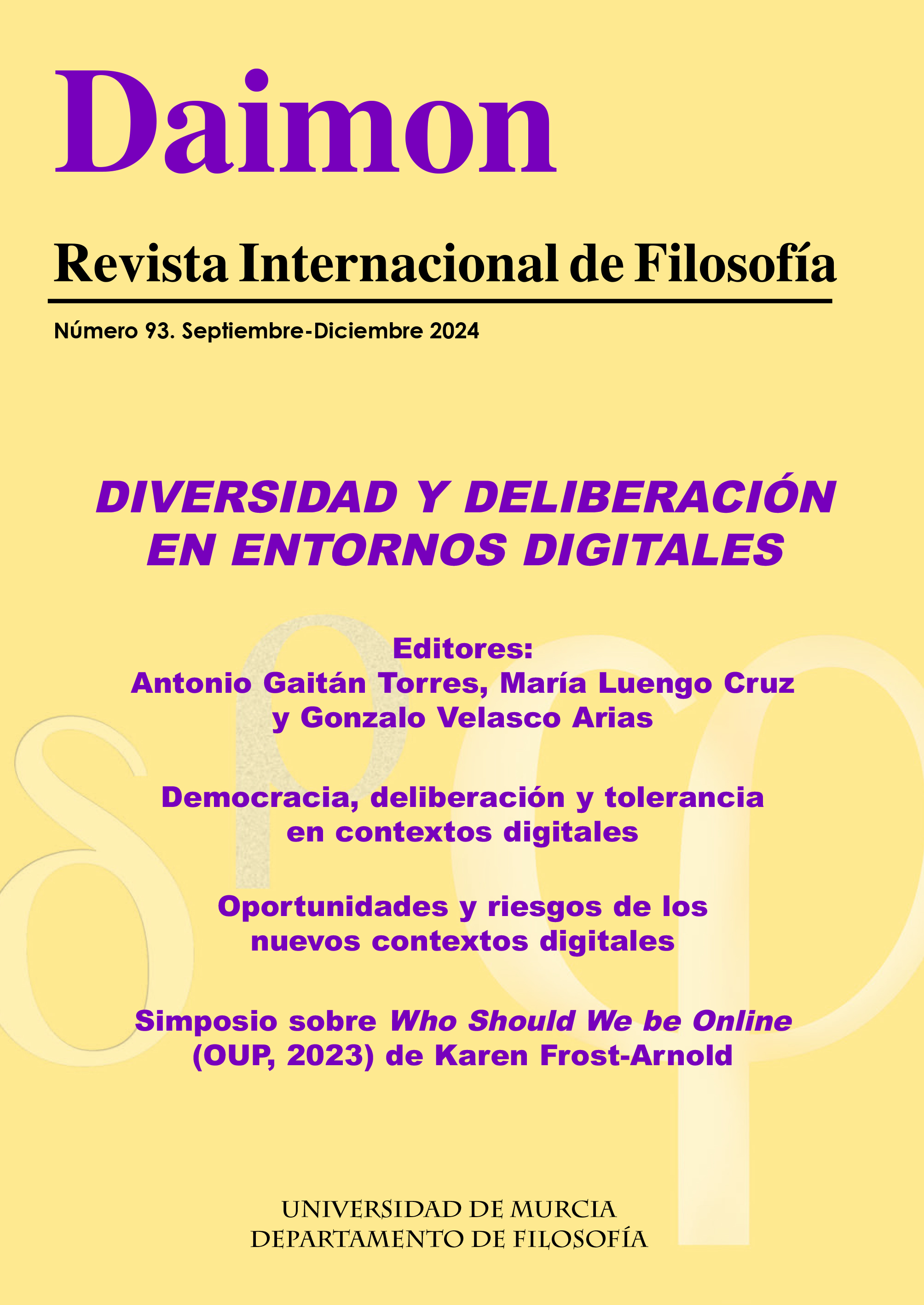Epistemic communities and trust in digital contexts
Agencias de apoyo
- Fundación BBVA
- Ministerio de Ciencia e Innovación
Resumen
En este artículo se analliza el concepto de 'comunidad epistémica' usado por Karen Frost-Arnold en Who Should You Be Online? (OUP, 2023). La primera sección sitúa este concepto en el argumento general del libro. La segunda sección separa tres posibles sentidos de 'comunidad epistémica' - sistémico, agregativo y grupal - e integra esos sentidos en el argumento general desarrollado en WSYBO. La tercera sección se centra en el sentido que considero más problemático, el sentido grupal. Se argumenta que, aunque algunos grupos cerrados contribuyen a generar conocimiento dentro de una comunidad epistémica, esas ventaja opera dentro de un abánico de posibilidades bastante estrecho, limitado tanto por la posibilidad de estructurarse como un grupo excluyentes como por la possibilidad de conformar grupos que vician debates desde dinámicas de pertenencia grupal.
This commentary focuses on the notion of ‘epistemic community’ and its role in underpinning the general argument that Karen Frost-Arnold presents in Who Should You Be Online? (OUP, 2023). The first section presents the general argument of WSYBO, outlining the general structure of the book and its central concepts. In the second section, three possible senses of ‘epistemic community’ are distinguished – systemic, aggregate and group-oriented. The third section explores tensions around a variety of group-oriented epistemic community. It will address two ways in which certain closed epistemic communities organized around a shared identity can deviate from the epistemic ideals that guide Frost-Arnold's project. Some enclosed epistemic communities can be organized around exclusionary dynamics. Other enclosed epistemic communities may organize and grant membership around debates or controversies, affecting the deliberative quality of those debates. The epistemic potential of closed epistemic communities organized around a shared identity depends largely on avoiding these two deviations.
Descargas
-
Resumen374
-
PDF 145
-
HTML 47
Citas
Boyer, P. (2020). Minds Make Societies. How Cognitions Explain the World Humans Create, Yale University Press.
Furman, K. (2022). ‘Epistemic Bunkers’, Social Epistemology, DOI: 10.1080/02691728.2022.2122756
Gaitán, A. (2024). ‘La psicología de las emociones políticas’, en Gómez-Ramos, A. Velasco, G. (eds.). Atlas de emociones políticas, Madrid, Trotta.
Habgood-Coote, J. (2024). ‘Toward a Critical Social Epistemology of Social Media’, in Lackey, J. McGlynn, A. (eds.). Oxford Handbook of Social Epistemology, Oxford University Press.
Mercier, H. Sperber, D. (2017). The Enigma of Reason, London, Penguin
Nguyen, C. T. (2018). ‘Echo Chambers and Epistemic Bubbles’, Episteme, doi:10.1017/epi.2018.32
Rini, R. (2017). ‘Fake News and Partisan Epistemology’, Kennedy Institute of Ethics Journal, 27 (52), pp. 43-64
Squires, C.R. (2002), ‘Rethinking the Black Public Sphere: An Alternative Vocabulary for Multiple Public Spheres’. Communication Theory, 12: 446-468. https://doi.org/10.1111/j.1468-2885.2002.tb00278.x
Sunstein, C. (2009). Republic 2.0, Princeton University Press.
Van Leeuwen, N. (2023). Religion as Make Believe. A Theory of belief, imagination and group identity, Harvard University Press.
Williams, D. (ms). ‘Identity-defining beliefs
Derechos de autor 2024 Daimon Revista Internacional de Filosofia

Esta obra está bajo una licencia internacional Creative Commons Reconocimiento-NoComercial-SinObraDerivada 3.0.
Las obras que se publican en esta revista están sujetas a los siguientes términos:
1. El Servicio de Publicaciones de la Universidad de Murcia (la editorial) conserva los derechos patrimoniales (copyright) de las obras publicadas, y favorece y permite la reutilización de las mismas bajo la licencia de uso indicada en el punto 2.
2. Las obras se publican en la edición electrónica de la revista bajo una licencia Creative Commons Reconocimiento-NoComercial-SinObraDerivada 3.0 España (texto legal). Se pueden copiar, usar, difundir, transmitir y exponer públicamente, siempre que: i) se cite la autoría y la fuente original de su publicación (revista, editorial y URL de la obra); ii) no se usen para fines comerciales; iii) si remezcla, transforma o crea a partir del material, no podrá distribuir el material modificado.
3. Condiciones de auto-archivo. Se permite y se anima a los autores a difundir electrónicamente las versiones pre-print (versión antes de ser evaluada) y/o post-print (versión evaluada y aceptada para su publicación) de sus obras antes de su publicación, ya que favorece su circulación y difusión más temprana y con ello un posible aumento en su citación y alcance entre la comunidad académica. Color RoMEO: verde.











